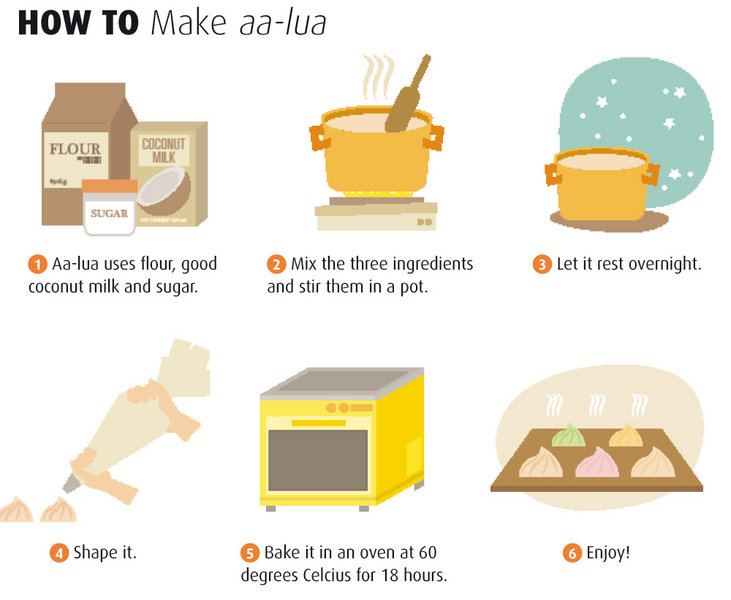Bangkok is really breaking free of the old stigma regarding Thai food, with locals finally accepting to pay more for Thai food in swanky restaurants, as long as it’s authentic. It started with Bo.lan, Nahm and Soul Food Mahanakorn, but new openings like Supanniga, Issaya and Thai Lao Yeh have shown this acceptance is here to stay. Thai desserts, on the other hand, haven’t quite surfed the trend. Although served at the aforementioned venues, we’re definitely not seeing Thai-centric kanom venues attract the kind of queues that the honey toast at After You garners. Despite the relative obscurity, there are encouraging signs that Thai sweets could be the next big thing, if people woke up to the complex and delicate techniques used to make them.
History books say Thai desserts were only made from flour, palm sugar and coconut before Maria Guyomar de Pinha of Portugal introduced the use of egg yolk-based recipes during the mid-17th Century. But even then, desserts remained a rare treat. “They were only really for ceremonies and everyone had to help because they were very delicate to make,” explains Dan Bunnag of the traditional Thai sweet store Sri: Thai Delicatessen. Not only were desserts for special occasions, but they were made according to closely guarded techniques. “When we were working on making our piak poon stickier, we realized Thais don’t share this kind of information,” says Dan. “You have to find out for yourself.”
Thai desserts have also failed to evolve, as Jakthong Ubolsootvanich, owner of dessert cafe Let Them Eat Cake, points out: “A modern form of Thai sweet hasn’t emerged. People complain about new things right away without experiencing them, or looking at the ideas behind them.”
However, Chef Ian Kittichai whose Issaya Siamese Club serves up Thai fusion desserts that experiment with presentation, suggests this isn’t always the case. “The people who come to Issaya, both Thais and expats, are generally open-minded when it comes to Thai desserts. They understand that we’re trying to educate them about desserts that perhaps aren’t so widely appreciated.”
When it comes to the issue of trying to make Thai desserts more popular, presentation is important, says Kittichai. As is knowing your dessert’s ingredients and history: “You should try to pass this knowledge onto your customers.”
Dan, from Sri, argues that increasing awareness about Thai desserts needs to happen outside of restaurants, too. “Look at how Japan takes their culture seriously and how their young people are so well-informed. The Thai dessert scene would be much better once Thais are more proud of their own culture,” he says. Prae Lavanamal of Pon Kum Wan in Hua Hin, too, says the new generation can’t even match the name of a dessert to a picture. “They need an education to know how delicate the craftsmanship is,” she says.
“Young people today appreciate only Western, Japanese or Korean stuff. They look down on Thai food. If it’s expensive, they won’t pay. Same with Thai desserts; I sell kanom tom for B60 and customers say it’s too expensive right to my face, which makes me mad. They never think about how much work goes into their creation,” Dan says.
Prae says that even though she knows how to bake, she simply prefers Thai desserts. Prae says you need roughly two hours to bake a regular cake that sells for over B100 a slice. “I could do that, but I just don’t want to. Even though something like aa-lua needs three days—to mix the flour, coconut milk and sugar together, leave it to form, and then bake for 18 hours—some customers tell me B60 is too expensive for a box of it. It’s sad but I won’t give up.”
Along with some other Thai dessert makers, Prae has joined with the Innovative House of Thailand Research Fund to breathe new interest into Thai desserts by such methods as changing their size, decreasing their sweetness and changing their packaging. Her hope for Siam’s sweets? “We don’t expect Thai desserts to ever be as popular as certain foreign desserts, just another alternative that people won’t forget to try every now and then.”
Where to Buy Thai Desserts in Bangkok
Sri. G/F, K-Village, 93, 95 Sukhumvit Soi 26. Open daily 8am-8pm. G/F, Central Chidlom, Ploenchit Rd. 089-923-5477. Open daily 10am-9pm
Pon Kum Wan. Plern Wan, Phetkasem Rd. (between Hua Hin Sois 38 and 40), Hua Hin. 089-688-4053. www.ponkumwan.com. Open daily 10:30am-8pm
Issaya Siamese Club. 4 Soi Sri Aksorn, Rama 4 Rd., 02-672-9040. www.issaya.com. Open daily 11:30am-2:30pm; 6-1

Advertisement















